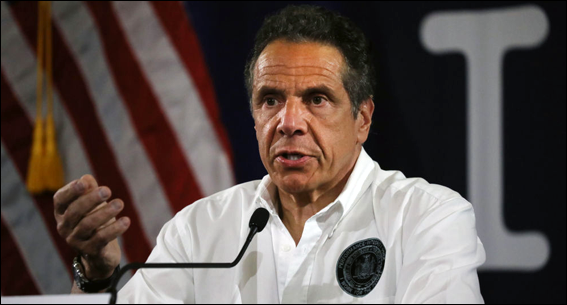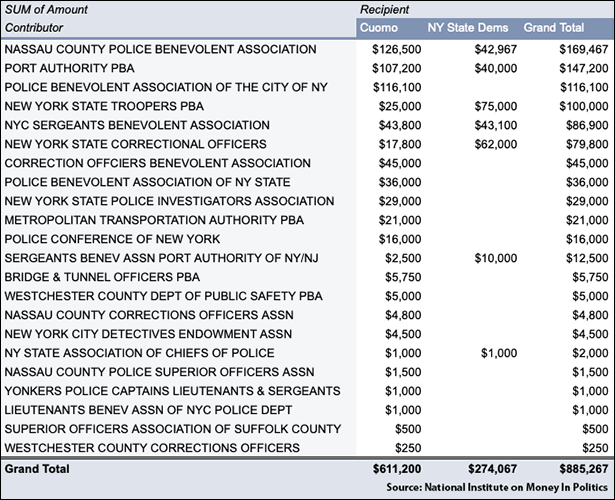
New York is a blue state -- Democrats control the governorship, every statewide constitutional office, and both chambers of the legislature. And yet for all their talk of civil rights, New York legislators have still not passed a package of bills designed to bring accountability to local police departments -- and New York’s governor is now suggesting that police violence has not been happening, when clearly it has.
Maybe that has something to do with a flood of money that has made New York politics another shade of blue -- police blue.
In all, police unions and associations have delivered more than $7 million to current New York state elected officials, according to campaign finance data from the National Institute on Money In Politics. That includes $600,000 to Cuomo during his gubernatorial campaigns. Police unions have also delivered more than $274,000 to Cuomo’s New York Democratic Party since 2010. Democratic Senate Leader Andrea Stewart-Cousins and Democratic Assembly Speaker Carl Heastie have received $187,000 and $76,000 over their careers, respectively.
To date, police reform legislation has remained bottled up in the legislative committees that Stewart-Cousins and Heastie control.

Accounting for all campaign money from police, firefighters, and emergency medical technicians, Cuomo has received the largest share of that money of any public official in the country. Five of the top 10 biggest recipients of that cash in the entire nation are New York public officials.
In recent days, some New York legislators have started returning police donations.
Fight Over Police Transparency Legislation
As police money has flooded into New York politics, Cuomo has repeatedly gone to bat for police interests.
For instance, amid police violence throughout New York City, Cuomo called for the deployment of more police, and apologized to the city’s police chief for mildly criticizing them. He has also imposed a city curfew designed to halt peaceful protests, and today he suggested that police violence has not occurred in New York City. While he did pocket veto a bill in 2015 that critics said would have weakened elected officials’ power to discipline police officers, he has not pushed a key section of long-sought police reforms in the legislature, known as the Safer NY Act.
At issue is a bill to repeal the 50a provision in New York state law that critics say keeps police misconduct records secret. The Albany Times Union notes that the “statute prevents the public, and in most instances defense attorneys, from accessing the disciplinary records of police officers, including criminal allegations that may have been handled internally… In many departments, civilian police review boards are not allowed to know the identity of the officers whose conduct they are reviewing, including whether an officer has been the target of multiple complaints.”
Critics argue that police can be more easily held accountable if the records are public. However, City and State has reported that “opposition from police unions – and lukewarm responses from the governor and the state’s biggest police department – have slowed efforts to repeal or amend the law.”
The Times Union pointed out that Cuomo “has never offered his own bill to repeal the statute or directed the State Police to release their personnel files, as he has said New York City should do. Nor has he sought to add legislation to repeal the statute in his annual executive budgets.”
In 2016, Cuomo deflected efforts to repeal the law, asserting that cities could go around it if they chose. Earlier this year, Communities United for Police Reform said it was “disappointed in Governor Cuomo’s failure to address reducing police violence and improving police accountability and transparency in New York State.”
Renewed Push For Repeal
Under increasing pressure this week, Cuomo announced he now supports reforms to the police secrecy law. However, 85 civil rights groups, unions and other grassroots organizations insist that the law must be fully repealed, not merely reformed.
“The continued police secrecy in New York enables that police violence and allows abusive officers to continue to act with impunity,” they wrote to legislative leaders in Albany. “We should be able to look up the misconduct and disciplinary records of every officer who mass-pepper sprayed, assaulted, blatantly covered their badge numbers and engaged in other abuse of authority and violence against New Yorkers. Instead, we are left in the dark and abusive police officers are given special rights and shielded because of 50-a.”
They concluded: “The time to pass a full repeal of 50-a is now. We cannot afford to entertain proposals to amend 50-a that will give a false sense of progress while loopholes continue to entrench police secrecy.”
Andrew Perez contributed research and reporting to this story.




